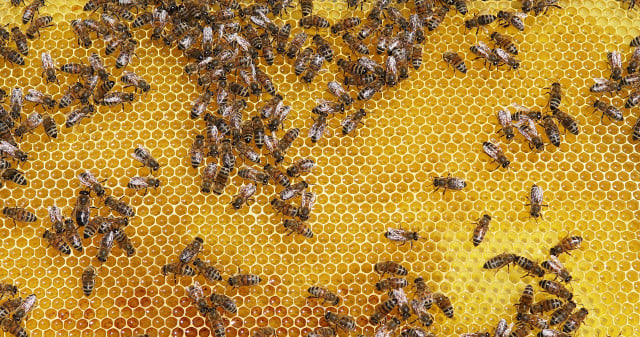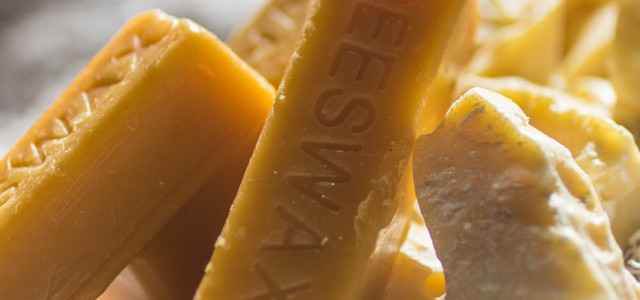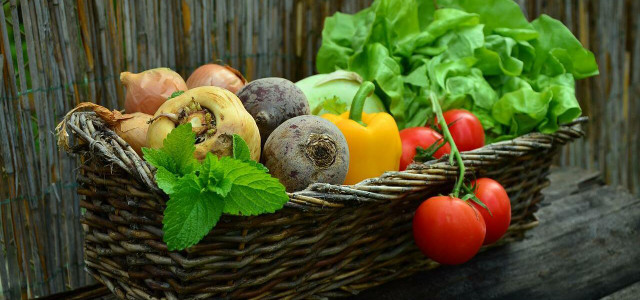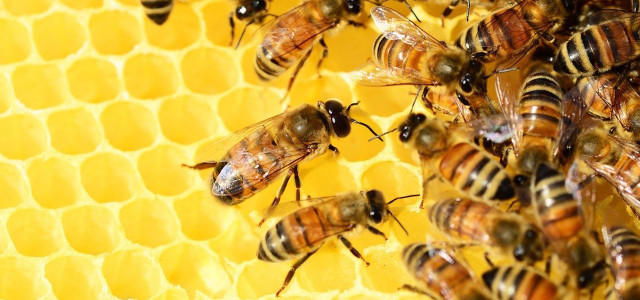Whether beeswax is vegan or not really depends on your definition of veganism. Read on to find out what there is to consider.
Whether beeswax is a cruelty-free and vegan product is sometimes debated. On one hand, the product is all natural, made by honey bees to construct their homes and store the honey they create (honeycomb). The beeswax does not contain dead bees, nor does it directly cause their death, so it is considered by most a vegetarian product at the least.
However, others argue that the bees must be removed from their homes and are thus deprived of both their safety and food source to obtain the beeswax, which makes it a non-vegan product. They claim that beeswax has only been obtained by exploiting the bees and also removes a product they would otherwise use.
A further complication lies in the fact that beeswax has now become so popular that it is an ingredient in many items such as polish, lip balms, and candles and is thus mass produced. Harvesting enough beeswax for this million-dollar industry means that honeybees are exploited further for mass production.
To many, this large-scale exploitation makes beeswax a non-vegan product.
Beeswax Isn’t Vegan — in Most Definitions
To decide whether you want to use beeswax or buy product that contain it, you need to decide what veganism means to you. Read our guide to help you out with that: What Does Veganism Mean and Is the Diet for You?
According to vegan.com, for example, vegan food excludes “every food of animal origin” and they acknowledge that the “meaning of vegan can extend beyond food”. According to this, beeswax is not a vegan product.
The Vegan Society offers a more detailed definition:
“Veganism is a philosophy and way of living which seeks to exclude—as far as is possible and practicable—all forms of exploitation of, and cruelty to, animals for food, clothing or any other purpose; and by extension, promotes the development and use of animal-free alternatives for the benefit of animals, humans and the environment. In dietary terms it denotes the practice of dispensing with all products derived wholly or partly from animals.”
According to this definition, you might feel that beeswax can indeed be a vegan product — if it is harvested in a way that does not harm or exploit the bees. It is inarguable, however, that the beeswax is removed from the beehive with the bees consent and that the removal is not in their interest, no matter how carefully it is being done.
What Is Beeswax Used For?



Beeswax has been used for hundreds of years. Today it is commonly used in many ways. Within the home, beeswax is used as a furniture or general polish, envelope sealer, to make candles, and as food wraps.
It is also commonly found in lip balms, body butters or lotions, soaps, mascaras, and balms for skin or beards. All of these uses (and many more) make beeswax a popular item for manufacturing at such a large quantity.
5 Vegan Alternatives to Beeswax
If you want to avoid using beeswax because it is not vegan and cruelty-free, try one of these alternatives.
- Sustainably harvested carnauba wax — Carnauba wax is a common vegan replacement for beeswax in body lotions and mascaras, but should only be used if it is sustainably harvested. This wax is made from palm oil. The palm industry is a large contributor to deforestation, which is why you should only purchase carnauba wax if it is sustainable.
- Soy wax — Soy wax can be used in place of beeswax in candles or balms, however, like carnauba wax, should be only purchased if it is sustainably made. Soy is commonly genetically modified, so make sure you buy soy that has not been modified. Once you got your hands on sustainably produced soy wax, learn how to make soy candles at home.
- Bayberry wax — Bayberry wax is a vegan choice for replacing beeswax in candles. It is made by boiling the berries and taking the wax that surfaces.
- Candelilla wax — Candelilla wax can be used as a replacement for beeswax in balms and general polish or varnish. Buy the vegan alternative in health food stores or online.
- Plant oil — Many vegan-made plant oils such as coconut or olive oil can be used in body lotions and balms in place of beeswax. These have many benefits, including moisturizing your skin and hair. Be sure to buy organic online or in health food stores. Check out our guides on olive oil for your face, and coconut oil for your hair, as well as beards.
Read more:
- 11 Flowers for Bees: Turn Your Garden or Balcony Into a Bee Paradise
- Can You Eat Honeycomb? Benefits, Uses
- Don’t Worry, Bee Happy: 10 Tricks to Keep Wasps Away
Do you like this post?









